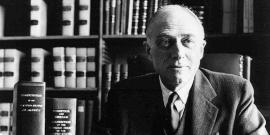Grounding politics in “religion,” does not solve any of the problems Buckley identifies in the natural law, it just pushes them further down the road.
Further Thoughts on Hadley Arkes and Natural Law Constitutionalism
Professor Ramsey has posted the following response on the Originalism blog to Hadley Arkes’ earlier reply to Ramsey’s review of Constitutional Illusions and Anchoring Truths. Liberty Law Blog thought it would be of further interest to post this interesting discussion.
Michael Ramsey:
Without, I hope, unduly prolonging the discussion or repeating what I wrote earlier, here are a few further thoughts on the questions he puts directly to me.
It may be true that we must often look to background principles to understand the text – as Professor Arkes puts it, “the task of judging cases will persistently draw us back to those principles that were there before the text was made.” There remain (at least) two different ways to understand those principles – as the people who drafted and ratified the language in question understood them, or as we now think they are best understood. I don’t think these are the same, or collapse into one other.
Professor Arkes writes:
I recalled to my friend [Justice Scalia] that in the arguments in the Senate over the Fourteenth Amendment, Lyman Trumbull had to assure his colleagues that nothing in that proffered Amendment would challenge those laws in Illinois as well as Virginia that barred marriage across racial lines. And it was as clear that, if he couldn’t offer those assurances, there was no way that the Fourteenth Amendment would stand a chance of passing. Well does that mean that the Court should not have taken the case in Loving v. Virginia? That it should have held back from striking down the laws on miscegenation? I put the question to my friend, and he was honest enough to say that he would have to think about it. But I can’t imagine he would finally say that Loving v. Virginia had been improvidently accepted for argument and wrongly decided. My hunch—subject to correction—is that Prof. Ramsey would not make that move either.
But in that case we would put the question: How would he or Justice Scalia make that decision in Loving without appealing to a deeper principle on the wrongness of racial discrimination– even though the implications of that principle had not recognized and accepted at the time? As I’ve pointed in other places, it is no knock on Lyman Trumbull that he didn’t see all of the implications springing from the principles he was articulating in the Fourteenth Amendment. After all the life of moral experience is a life of often discovering the implications of our own principles, principles that have heretofore gone unnoticed.
I would say that there are two steps to the analysis. We can begin by asking, did the Fourteenth Amendment’s language, as it was best understood in the 1860s, prohibit bans on cross-racial marriage? (I’m glossing over some methodological questions about exactly what we would be asking and how we would be answering it; I don’t think those are relevant for present purposes). This is just a historical question, akin to asking whether the unamended Constitution or the constitution of the Confederacy contained such a rule.
Not being a Fourteenth Amendment scholar (at least apart from the first sentence), I’m not sure of the answer; I don’t think Trumbull’s statement alone settles it, and David Kopel has a great recent post on how early post-ratification judicial decisions actually found against the bans. I’d need to know more about the common understanding of “equal protection” (assuming that is the language that matters) and its relationship to cross-racial marriage bans at the relevant times. I think it quite possible that the public meaning of the phrase at the time did preclude the bans (and Trumbull was lying, or kidding himself). In any event, these are historical questions; they don’t turn on what I think the right moral principle is.
To avoid fighting Professor Arkes’ hypothetical, let’s assume it’s clear that, as mid-nineteenth-century Americans understood the meaning of equality, it didn’t forbid bans on cross-racial marriage. The second question is what, normatively, to do with that (hypothetical) conclusion. Obviously if we are talking about the Confederate constitution we wouldn’t do anything with it, because it’s just a historical artifact. There’s a normative dilemma because we regard the Fourteenth Amendment, in some sense, as a source of law today. For the positivist/originalist of Justice Scalia’s view, I would think the answer is nonetheless to apply the Amendment’s equality principle as its enactors understood it. (True, this may lead to unpalatable results. That is one of the difficulties with positivist originalism; if you don’t encounter this problem at least part of the time, you probably aren’t doing it right).
In contrast, as I understand it, the natural law position is that there is a true meaning of equality incorporated in the Fourteenth Amendment which we can discover through reason irrespective of (and perhaps contradictory to) the nineteenth-century view of the matter. What matters for this position is not what equality was understood to mean at the time of enactment, but what we now understand equality to mean. (I recognize that under a natural law approach it isn’t the nature of equality that’s changed, but rather our understanding of it).
These seem to me to be two distinct positions, both understandable on their own terms, but asking very different questions. To the extent Professor Arkes tries to blend the two, I don’t follow him. I have no reason to suppose that the mid-nineteenth century understanding of equality was necessarily the same as mine. That being so, I can pick one or the other, but when they diverge, there remains a choice to be made. Which is the right approach for modern adjudication is, of course, another question (and one on which I didn’t express an opinion in the review).
Now I’ll turn to a second point that Professor Arkes resists: that there is an affinity between the natural law protection of cross-racial marriage in Loving v. Virginia and (some) modern arguments that the Fourteenth Amendment protects same-sex marriage. Professor Arkes says the difference between his view of Loving and others’ view of same-sex marriage is that “one of us has it right and the other wrong[,] [t]hat one set of reasons is in fact better, more defensible, than the other[.]” Perhaps so (though I don’t find his brief statement of natural law arguments against same-sex marriage very persuasive); but that response doesn’t address my point that the structure of the arguments is the same – both approach the Constitution in the same way. They take the language of the Amendment to stand for a principle which they elaborate (well or poorly) without being bound by the way the enactors of that language understood it. I’m not saying (here) that there’s anything wrong with that; I’m just saying that it leads to a Constitution that as a practical matter evolves as our understanding of true principles evolves. And also as a practical matter, in a world of aggressive judicial review it leads to a Constitution given meaning according to the moral reasoning of modern judges.
A quick final point: Professor Arkes writes,
The judges are told [by positivists] to avoid moral reasoning because they cannot be sure that they are reasoning rightly. But then how do they know that they have reasoned rightly about that principle asserting, as an anchoring point, their incapacity to reason rightly? Prof. Ramsey suggests that the question is, “are we better off” when judges take seriously this need to engage in moral reasoning? Is he pointing to some standard of utility?: “Act utility,” “Rule utility”–or some other standard? What is the principle? And where in the Constitution does he find it?
I agree that ultimately the choice of positivism versus natural law (versus other approaches) in constitutional adjudication is in a sense extraconstitutional (some originalists would disagree, I think). As I said in my review, I think it comes down to what role we want judges to play in our society. That is a question of principle (and various principles might apply — I’m not sure why I’m called on to defend one in particular). I don’t think that means positivism dissolves into self-contradiction; there are non-positivist reasons we might want positivist rather than naturalist judges.

